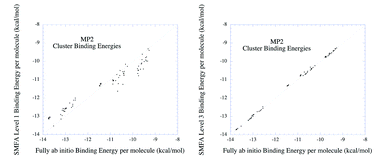Spencer R. Pruitt, Matthew A. Addicoat, Michael A. Collins and Mark S. Gordon
Phys. Chem. Chem. Phys., 2012,14, 7752-7764
DOI:
10.1039/C2CP00027J,
Paper
Two electronic structure methods, the fragment molecular orbital (FMO) and systematic molecular fragmentation (SMF) methods, that are based on fragmenting a large molecular system into smaller, more computationally tractable components (fragments), are presented and compared with fully ab initio results for the predicted binding energies of water clusters. It is demonstrated that, even when explicit three-body effects are included (especially necessary for water clusters due to their complex hydrogen-bonded networks) both methods present viable, computationally efficient alternatives to fully ab initio quantum chemistry.
